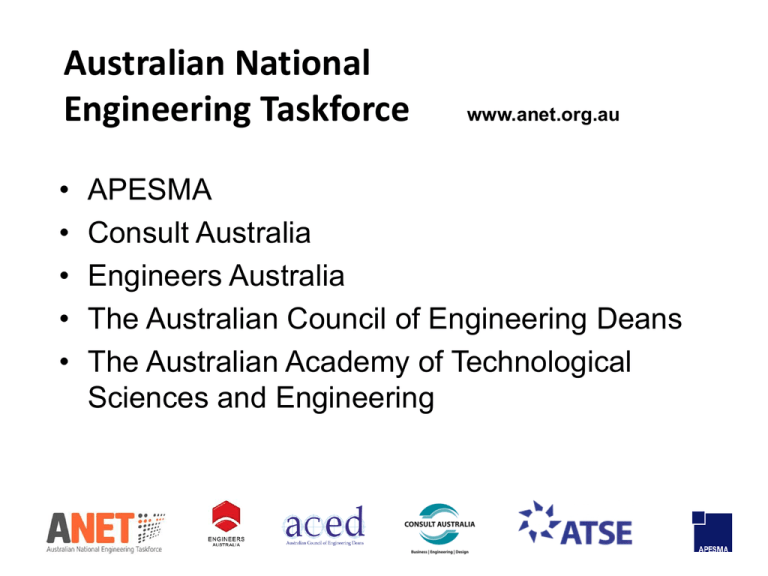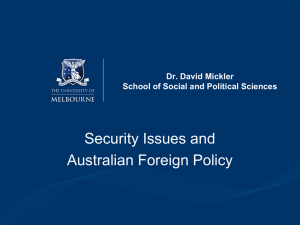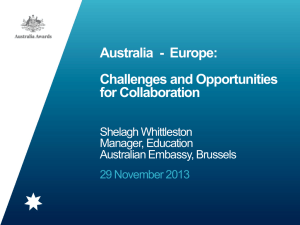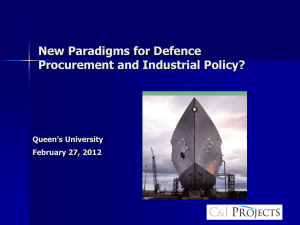Australia Needs Engineers - ANET
advertisement

Australian National Engineering Taskforce • • • • • www.anet.org.au APESMA Consult Australia Engineers Australia The Australian Council of Engineering Deans The Australian Academy of Technological Sciences and Engineering Australia Needs Engineers Government is investing in infrastructure. • Stimulus spending - $277 billion by 2012 • 2010 budget announced $5.6 billion for the Resources Infrastructure Fund An Identified Capacity Shortage • A July 2010 CEO survey from the Australian Industry Group found that engineers were in demand, with half of companies surveyed giving the management of skills shortages top priority or high priority. • In 2010 the National Resources Sector Taskforce heard from employers that there will be a heavy shortfall in engineering skills in the resources sector without investment. A Recognised Shortfall • POWER: The Australian Power Institute has stated that in the next 5 years an additional 700-1000 graduate engineers will be required in power due to retirements and growth in the industry. • WATER: The Water Services Association of Australia has predicted that 25-27% of the workforce will have retired by 2017. • RESOURCES: It has been estimated that at its peak the Gorgon LNG Project in WA will require 6,000 workers. How will this affect other industries in the state? Industry Needs Engineers • Blake Dawson’s ‘Scope for Improvement’ report discovered cost overruns of some $200 million for every $1 billion spent on major infrastructure projects in 2008, due mainly to scoping shortfalls. • Consult Australia’s Skills Survey found that two thirds of consulting firms delayed projects last year because of staff shortages. Employers had most difficulty attracting mid-level and senior engineers. A Workforce Development Problem • The engineering profession is ageing. – Engineers Australia estimated that 70,000 engineers will have retired between 2006 and 2011. Only half that number will graduate from university during that period. • There are too few new engineers – 40% of commencing engineering students do not complete their engineering degree. – 75% of graduates will leave the profession within 10 years. – Only 17% of engineering graduates are women, unacceptably low. • Immigration: sustainable? – 40% of engineering graduates from Australian universities were overseas students in 2006. – In 2007-8 around 80% as many engineers immigrated to Australia as graduated from Australian Universities. Engineer Survey: December 2009 Engineer Survey: December 2009 Engineer Survey: December 2009 • We have insufficient qualified people to make effective judgement calls regarding the expenditure of public money. We have a large number of partially qualified people doing the job of senior engineers. • I am the youngest. There has been NIL succession plan - All my peers will retire : 2 staff in two years 1 in four years 2 in ten years • We moved from having a large in-house engineering workforce, to outsourcing most functions… We struggle to remain an informed client and are desperately trying to build technical expertise in key areas that cannot be met through the private sector. The current situation is inadequate to meet current demands, let alone provide a sustainable model to meet future demands. Engineer Survey: December 2009 • Not enough personnel in auditing, quality and compliance with engineering and/or technical skills. Non-technical people are assessing engineering management systems for compliance and not properly comprehending technical aspects and risks. • Anytime one of us has a technical question on flotation, we go to the same guy who is close to retirement and only works 2 days a week. It means delays in making decisions on our projects, or winging it. Industry support • • • • • • • • • • • • Australasian Railways Association; Australian Railway Industry Corporation (ARIC); Australian Rail Track Corporation; Queensland Rail; Railcorp; Roads Australia; Transport and Logistics Centre (TALC); Infrastructure Partnerships Australia; Austroads; The National Transport Commission (NTC); The Australian Construction Industry Forum (ACIF); The Civil Contractors Federation (CCF); • • • • • • • • • The Australian Constructors Association (ACA); Master Builders Association; The Australian Council of Built Environment Design Professionals (BEDP); The Australian Procurement and Construction Council (ACPP); The Chartered Institute of Purchasing and Supply Australia (CIPSA) Australasian Institute of Mining and Metallurgy (AusIMM); The Australian Power Institute; Water Services Association of Australia; The Warren Centre for Engineering Excellence Government Leadership • Skills Australia have nominated Engineering as an occupation requiring workforce development interventions to address market failure. • ANET has been funded by Government to begin building a national workforce development agenda for engineering. ANET: Projects For 2010 1. Demand and workforce development analysis by industry/sector: priority, road and rail. • • • Draft report by June, final November 2010 Developing a model for industry analysis Creating consensus and engagement with key stakeholder concerns 2. Education pathways, specifically VET/HE articulation and best practice – unblocking supply. Report to Government by the end of 2010 Next Steps: A National Plan • Develop education policy proposals, including mechanisms for improved industry involvement, on the job development and intergenerational transfers. • Work with National Resource Sector Employment Taskforce and Skills Australia to assess needs. • Apply ANET research model to other sectors: Power, Local Government etc. • Incorporate work/findings of Water sector employment taskforce • Work with Government on sustainable migration issues








